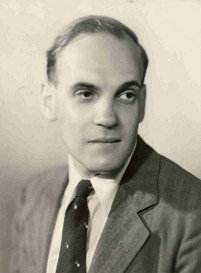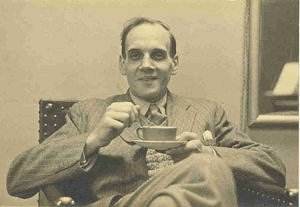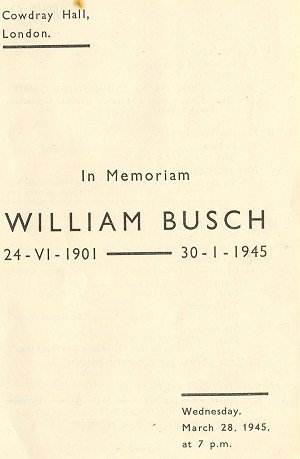WILLIAM BUSCH by Sinclair Logan

William was born June 25th 1901 and died at Woolacombe, Devonshire
in January 1945. His parents, who were originally German, became
naturalised British subjects some time before the first world
war. Part of his early childhood was spent in South Africa, but
he received most of his education at various schools in England
and the USA. The variety of these early influences and environments
no doubt played its part in the making of a man who belonged in
no way to any ordinary type. Even as a boy he must have been completely
bilingual, for he spoke in German with many of his relatives and
English with most of his friends and teachers.
Music interested him when he was a child and he received piano
lessons at an early age. But he was in no sense an infant or child
prodigy and it was not until he was about 16 that his remarkable
talent was revealed and he decided to make music his career. He
was then in America and his first serious musical studies were
under France Woodmansee. He returned to London after the first
world war. In 1921 we went to Germany where he studied piano with
Leonid Kreutzer and harmony under Hugo Leichtentritt. In May 1924
he returned once more to London and it was there that the major
part of his musical training took place, under Miss Mabel Lander
for piano, with Alan Bush, Ireland and Van Dieren for composition.
He gave his first London recital in October 1929 at the Grotrian
Hall and his first broadcast in December of the same
year. He also appeared in Holland, Germany and the USA.
It was in composition however, that his chief talent lay. The
first evidence of this was the Gigue for piano, composed in 1923
which, if it did not show the marked originality of his mature
style, did at least reveal in a most effective piece, a composer
who was in full command of his technique. This was followed in
1927 by two pieces for wind instruments, which were first performed
in that same year. In 1928 he produced the first of his larger
works, Theme, Variations and Fugue in F Minor for piano. Here
we can see his mature style, his originality and vigorous contrapuntal
thinking which is entirely fresh, unconventional and convincing.
Then follows another interval of five years during which Busch
must have been too much occupied with concert work to allow him
either the time or the undisturbed state of mind which he needed
for composition. In 1933 came the Allegretto Quasi Pastorale,
a pianoforte piece and his first three songs. From 1935 composition
came more to take its rightful place in his life and concert appearances
became rarer. In this year appeared an Intermezzo for piano and
two more songs, none of these were published, though one of the
songs, a setting of the sixteenth-century lyric "Weep You No More"
ranks among his finest inspirations
1937 was an important year, for it produced a fine and original
setting for voice and string quartet of the "Ode to Autumn" by
Keats which, though it has received several performances, is not
yet published. In this year he also composed one more song and
began work on the Piano Concerto in F Minor which was completed
in 1939.
1939-40 came the Piano Quartet, dedicated to The London Belgian
Piano Quartet, who have given frequent performances of it with
great success and in January 1939 his Piano Concerto received
its first performance in a broadcast by the BBC Orchestra with
Clarence Raybould conducting and the composer as soloist. In the
same year he composed a Passacaglia for violin and viola. Shortly
before the outbreak of the second world war he was invited to
Paris to give performances of some of his compositions.

The war was to him a deeply personal tragedy, a fact which became
sharply discernible in some of his later works. During the few
years of his life which remained the profound distress which was
wrought in his highly sensitive nature often caused periods of
ill-health and the fact that he had relations and intimate friends
on both sides of the conflict did not ease the pain. This also
had an effect on his composition, which was brought to a standstill.
In 1940, after a short illness, he wrote in his diary "more
at ease now that composition is going more smooth/y. That is my
life!"
He spent the rest of his life at Woolacombe, Devonshire and served
in the Auxiliary Fire Service. The following works appeared during
his last five years:
1940-41 the Cello Concerto, which was, in his own words,
"inspired by and dedicated to Florence Hooton" who gave the work
its first performance at a "Prom" with Sir Adrian Boult conducting.
1942 The 'Nicholas Variations' inspired by his three-year-old
son, one of the most original and daring of his works.
1943 Three pieces for violin and piano, a suite for cello
and piano (of which the Prelude is one of his noblest conceptions)
and seven songs.
1944 A short but very remarkable song-cycle "There have
been happy days" comprising settings of five poems by Wilfred
Gibson. Also, four more songs, a piece for cello and piano entitled
" A Memory" (Elegie) based on the concluding song of the cycle.
At the time of his death Busch was at work on a violin concerto
but all that exists of this is a sketch of the first movement.
In January 1945 a daughter, Julia, was born. While visiting his
wife in a nursing home at Ilfracombe, all transport ceased owing
to unusually heavy falls of snow. It was essential he should return
to his little boy that night so Busch walked back to Woolacombe
along the now almost impassable cliff path which the snow had
made dangerous. On reaching home he was excessively exhausted
and very soon serious internal haemorrhage set in. No doctor could
be obtained in time and thus he died.
Busch' s nature was both sensitive and responsive and he had
a great capacity for strong and lasting friendship. He rated humanitarian,
ethical and spiritual values so highly that one would be tempted
to describe him as deeply religious, were it not that the term
usually implied an orthodox type which he in no way resembled.
Part of his nature was in close touch with his fellowmen, understanding
their weakness with a kindly sympathy, but another side of his
character was intensely introspective - remote and very much alone.
For one who shrank in acute distress from hurting anyone, his
fearlessness in saying what he felt should be said, on occasions
when others would seek refuge in silence, was a remarkable attribute.
He was unsparingly self-critical in all matters and this together
with the distraction of concert work may account for the reason
why his output was comparatively small. His music is invariably
the expression of his own nature and this is manifest in his work.
Busch was a composer whose work reveals a steady growth in all
its aspects, so much so that it is interesting to imagine what
he might have achieved if he had lived longer. By the time he
had found his maturity in the Theme, Variation and Fugue for pianoforte
and in the early songs, his music bore characteristic features
which were unmistakably his own. These never became mere mannerisms,
but they constantly recur in all his work. There is, for instance,
his fondness for the falling augmented fifth from the leading
note in a minor key; his use of isolated fragments of melody,
in quiet octaves, involving the use or suggested of the augmented
second; and, in especially in the later songs, his uncompromising
handling of major sevenths and minor seconds. The earlier works,
even of his mature period tend to be a little profuse in material-
excluding the Theme, Variations and Fugue for piano, which is
a model of concentrated, closely woven conciseness. As he developed,
however, his style became more economical and his writing, though
often highly complex, far less j complicated. His music is essentially
contrapuntal in character and he rarely uses a purely harmonic
medium. The few instances of this occur only in the songs and
then only when some element in the poem seems to him to demand
it. His most strikingly effective use of purely harmonic writing
occur in the powerfully arresting little song "The Snowdrop in
the Wind" of 1943 and the Song-Cycle of the following year. It
is rarely, if ever, possible to judge even the best of Busch'
s melodies independently of their background in the music or their
position in the work as a whole: it is the total effect of all
the elements in the texture which matters.
His large scale compositions are finely wrought works, thoughtful
in conception and impressive in performance. The Theme. Variations
and Fugue have already been described and the 'Nicholas Variations'
for piano of fourteen years later have an uncompromising boldness
and a startling originality in their presentation, the child soul
urgently clamouring to grow. The two concertos are symphonic works
of a very high order, in which form and content are finely balanced:
they are also well written for soloist and orchestra alike. The
Piano Quartet is a fine, virile work, brimming over with vitality
and of all the larger works is probably the one which makes the
most immediate appeal to audiences.
Lastly, the Song-Cycle "There have been Happy Days" though it
consists of only five short songs and occupies no more than ten
minutes in performance, should rank with the large-scale works,
because of its masterly design and its significant character.
This is perhaps his best achievement, the Work in which all his
finest qualities seem to reach a climax of concentration. None
of the early profusion here, only a ruthless economy of material.
The work is complex, yet stark in its clear-cut conciseness. A
group of themes (and one of these in particular) dominates the
cycle throughout and these are handled with intensely dramatic
effect. This song-cycle is the complete expression of Busch's
life. It is in fact in his songs that Busch was most original,
always excepting the 'Nicholas Variations', and it is not yet
generally realised that he actually wrote a new page in the history
of song. With Busch, more than any other composer, except Van
Dieren, the song must be regarded as a complete fusing of all
its constituent elements, but Busch, by a flash of intuition and
in the simplest possible way, often achieves a result similar
to that which Van Dieren arrives by far more complicated and elaborate
methods. Busch is at his best in his more serious songs, and at
his least effective in his settings of Blake's "Laughing Song"
and Herrick's "Fairies". Many of Busch's songs were written for
and dedicated to his friend Sinclair Logan
Among Busch' s smaller instrumental compositions, players will
search in vain for the "Morceaux" or the effective trifle, but
they may seek and find music of a sincerity and a poetic beauty
of which they will never tire.
Sinclair Logan May 30th 1950
